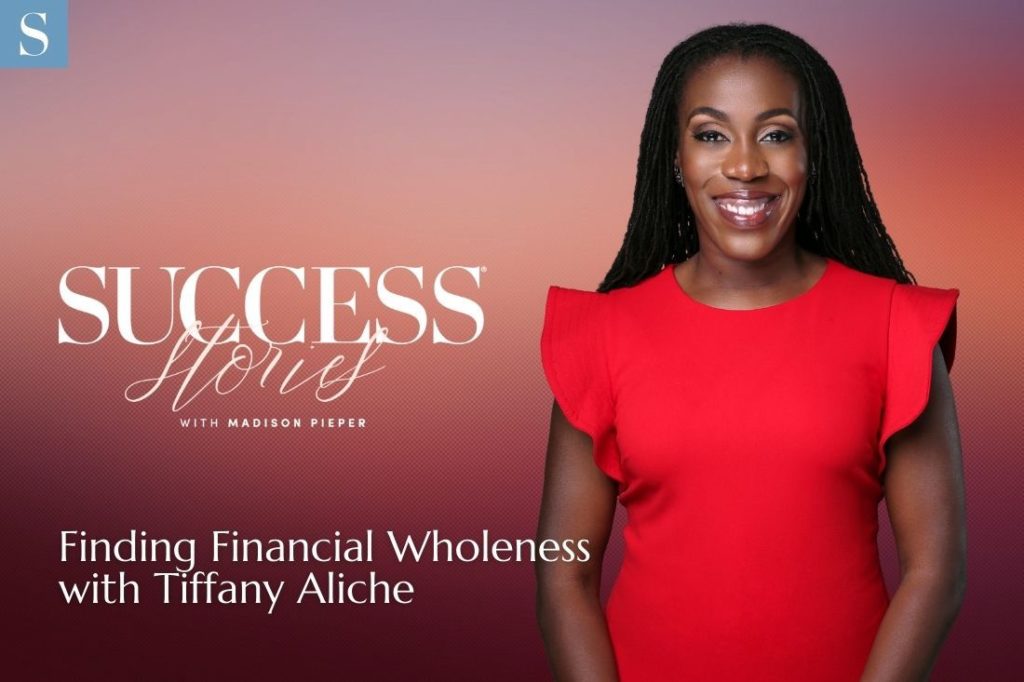If just reading “financial” in the headline made you want to skip this article, we promise you’ll feel much better about that word and its role in your life by the end.
Tiffany Aliche has always been more comfortable than most around money talk. Her dad was a CFO and accountant, and he passed his financial knowledge on to his five daughters. So Tiffany was surprised to find out that not everyone shared this perspective, especially women.
“It’s not just that women make less than men, there’s also less access to financial education [for women],” she says. “So not only did you make less, but you are less likely to know what to do with the less that you made.”
Tiffany is working to correct that gap. Known as “The Budgetnista,” she has written a financial advice book, Get Good With Money; runs financial courses through the Live Richer Academy; and co-hosts the Brown Ambition podcast.
A former preschool teacher, she’s also working to give the next generation better money managing tools. Tiffany pushed her native New Jersey to pass a law mandating financial education for middle school students. Up next: elementary schools.
On this episode of SUCCESS Stories, Tiffany talks to SUCCESS’s Madison Pieper about forgiving yourself for financial mistakes and why focusing on financial wholeness is more achievable for most people than financial freedom. Plus, she shares tricks to reduce your impulse purchases. Listen to the episode and read on for Tiffany’s best money advice.
Don’t beat yourself up about your past financial habits.
Everyone can think of a money mistake they’ve made that still makes them feel embarrassed. Maybe you took on debt you couldn’t pay off. Maybe you fell for a scam. Maybe you loaned money to someone you shouldn’t have trusted.
Whatever mistakes you’ve made with money in the past, you have to forgive yourself before you can move forward. And you have to trust that despite those mistakes, you are absolutely capable of building a solid financial foundation for yourself.
The secret a lot of finance experts won’t tell you—but Tiffany will—is that managing money in a way that gives you a good life is not as hard as it’s made out to be. If you can hold down a job, raise kids, plan a wedding, you can absolutely learn the finance basics you need to thrive.
“You’re already showing aptitude in other areas of your life,” Tiffany says. “It’s not a capability issue, it’s a confidence issue. Tell yourself, ‘If I can do this, I can certainly do that.’”
Aim for financial wholeness.
If your yet-to-be-achieved financial goals revolve around having enough money to do whatever you want with the rest of your life, it might be time to try a different approach.
Tiffany describes this as financial freedom, and points out that it’s a pretty exclusionary way to think about wealth. Most people will never be able to reach this point. But everyone can achieve financial wholeness, a concept based on 10 foundational financial areas Tiffany outlines in her book. They are:
- Budgeting
- Savings
- Debt
- Credit
- Learning to earn
- Investing for wealth and retirement
- Insurance
- Net worth
- Your financial team
- Estate planning
No matter how much money you make and have access to, if you can get these 10 components in hand, you can give yourself the life you want.
Stop those impulse spends.
Anyone who has emerged from an online shopping spree or a Target run wondering what they just bought already knows the draw of the impulse spend. At the time, these seem inconsequential. Yes, you had to move $100 out of your savings, but it was worth it to get that new rug, those new guest towels and… what else went into the cart?
These small expenses add up, and block you from spending more money on things that will ultimately bring you more joy and satisfaction. Here are three techniques Tiffany uses to make sure she’s channeling her money into the things that will bring her long-term happiness:
1. Make your money inconvenient.
Show the future version of yourself that’s tempted to splurge some tough love by making it harder for them to do so.
Tiffany recommends splitting every paycheck into four bank accounts:
- Your checking account for everyday spending
- A bills account with a separate card
- An online short-term savings account (aka the emergency fund)
- An online long-term savings account for bigger financial goals, like buying a car or a house
The online component is crucial. It takes between 24 to 72 hours to transfer money from online savings accounts to a checking account. That means that if you’re tempted to spend more than you have in your current account on an impulse buy, you can’t immediately dip into your savings.
Having that little pause can be enough to bring you to your senses. A spontaneous purchase feels much less fun when you have to wait 24 hours to complete it. As Tiffany says, “Inconvenient money gets saved.”
2. Ask yourself how you really feel about this purchase.
Before you buy anything, ask yourself:
- Do I need it? Is this something that will maintain your health or safety? E.g. food, medicine
- Do I love it? Will this thing still be bringing you joy a year from now? E.g. vacations, a TV
- Do I like it? Is the satisfaction you derive from this thing going to last less than six months? E.g. a rug, a cooking gadget
- Do I want it? Is this for instant gratification only? E.g. a candy bar, nail varnish
Need and love trump like and want. Prioritize saving your money for these things.
3. Say yes to your Love Bank.
Once you’ve decided how you really feel about a purchase, focus on putting money into your Love Bank. This can be an actual bank account you use to save money for those “Love” items.
For example, if you’re tempted by something that you know is only a “Like,” put that money into your “Love” account.
Framing decisions this way can also help with explaining them to other people. If you’ve decided that dining out is only a “Like” for you, but traveling to London is a “Love,” when people ask you out to dinner, tell them that you’re saying yes to London. Instead of saying no to them—which feels negative—you’re saying yes to a fun opportunity.
“It actually gets your friends excited, and you might find they now want to say yes to what’s in their Love Bank,” Tiffany says.
When you know how to take charge of your finances, money stops being the thing that gives you nightmares and starts being the thing that can make your dreams come true.
SUCCESS Stories with Madison Pieper is no longer releasing new episodes on the SUCCESS Podcast Network, but you can still listen to the full conversation below.






